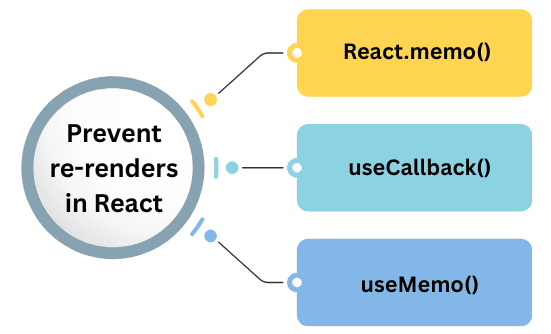React Preventing Unnecessary Re-renders
React re-renders components when their state or props change. This keeps the UI updated but can slow down large apps if it happens too often. Preventing unnecessary re-renders makes your app faster and more efficient.
Why React Re-renders Components
React re-renders a component whenever its state or props change. But even if the data stays the same (like when a parent re-renders), child components may still re-render — unless you optimize them.
Main ways to prevent re-renders in React:

1. React.memo() – Memoizing Functional Components
React.memo() is a higher-order component (HOC) that prevents unnecessary re-renders by memoizing the component’s output.
It only re-renders the component if its props actually change.
Syntax
const MemoizedComponent = React.memo(MyComponent);
Example
import React from "react";
const Child = React.memo(({ value }) => {
console.log("Child rendered");
return <p>Value: {value}</p>;
});
export default function Parent() {
const [count, setCount] = React.useState(0);
return (
<div>
<button onClick={() => setCount(count + 1)}>Increase</button>
<Child value="Static Text" />
</div>
);
}
What happens here:
- The
Childcomponent will not re-render whencountchanges - It only re-renders if its prop
valuechanges
Use React.memo() when:
- The component is pure (depends only on props)
- Props don’t change frequently
- Rendering the component is expensive
2. useCallback() – Memoizing Functions
In React, when you define functions inside components, they are recreated on every render.
Passing such functions as props causes child components to re-render — even if logic hasn’t changed.
useCallback() prevents this by memoizing the function reference.
Example
import React, { useState, useCallback } from "react";
import Child from "./Child";
function Parent() {
const [count, setCount] = useState(0);
const handleClick = useCallback(() => {
console.log("Clicked!");
}, []); // Function reference stays the same
return (
<div>
<h2>Count: {count}</h2>
<button onClick={() => setCount(count + 1)}>Increment</button>
<Child onClick={handleClick} />
</div>
);
}
export default Parent;
The child component will not re-render unnecessarily because handleClick is memoized.
3. useMemo() – Memoizing Expensive Calculations
Sometimes, a component runs heavy calculations or computes derived data on every render.
useMemo() helps by caching the result until the dependencies change.
Example
import React, { useMemo, useState } from "react";
function ExpensiveCalculation({ number }) {
const result = useMemo(() => {
console.log("Calculating...");
return number * 10; // Simulating heavy logic
}, [number]);
return <p>Result: {result}</p>;
}
export default ExpensiveCalculation;
useMemo() ensures the calculation runs only when number changes, not on every render.

